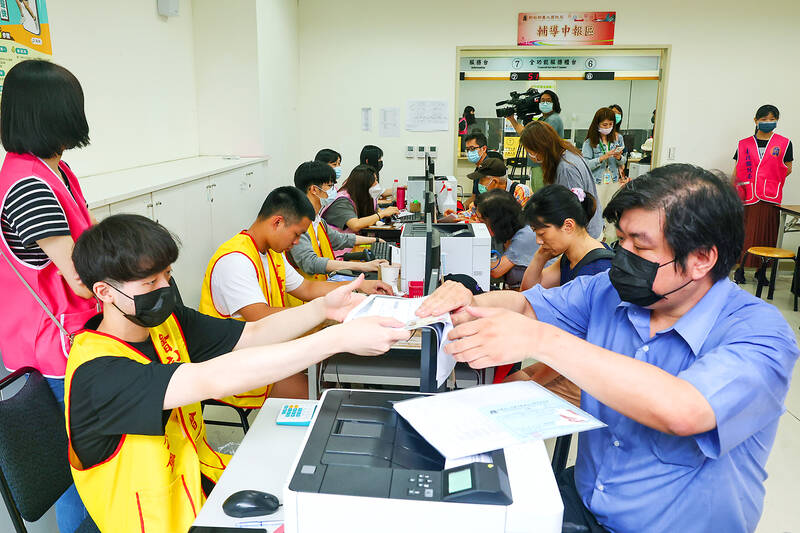Tax revenue last month more than doubled year-on-year to NT$621.7 billion (US$20.23 billion), as the COVID-19 pandemic-fueled moratorium for income tax declarations last year lowered the comparison base, the Ministry of Finance said on Friday.
The national treasury received a boost from an artificial intelligence (AI) fever that allowed securities transaction tax revenue to return to growth territory for the first time in nearly two years.
Corporate income tax revenue surged 12.8 times from a year earlier to NT$319.3 billion, while personal income tax revenue advanced 74.1 percent to NT$59.1 billion, the ministry said, attributing the bumps to different timings for annual income tax declarations.

Photo: CNA
The ministry last year extended the deadline for tax filing by one month to June, as spiking COVID-19 infections disrupted people’s daily activities, which led to poor showings for May last year, statistics official Liang Kuan-shuan (梁冠璇) said.
Securities transaction tax revenue grew 10.9 percent to NT$15.9 billion, ending 16 straight months of declines after daily stock market turnover expanded 9 percent to NT$309.9 billion last month, the ministry said.
The data reflect an improvement in investment interest, Liang said, adding that the momentum was evident this month when daily turnover reached NT$337.4 billion.
The improvement came after Nvidia Corp, the world’s biggest AI graphics chip supplier, posted strong earnings guidance for this quarter and beyond.
The recent visit of the company’s chief executive officer Jensen Huang (黃仁勳) to the Computex trade show in Taipei supported the frenzy, as Taiwanese electronics companies are part of Nvidia’s global supply chains.
“The state coffers benefited from the AI fever judging by the daily stock turnover, but it remains to be seen whether the uptrend can be sustained,” Liang said, adding that the recent daily trading volume beat the ministry’s forecast for this year.
Revenue from the land value incremental tax, a gauge of the property market’s health, fell 27.9 percent from a year earlier to NT$6.2 billion after the number of taxable cases decreased 7.8 percent to 51,942, the ministry said.
Last month’s fall in land value incremental tax revenue moderated from a drop of 34.5 percent in April, the ministry said.
Although the annual decline in revenue from the integrated house and land transaction income tax tapered off to 6.5 percent last month from a fall of 27.6 percent in April, it is too early to speculate on a recovery in the local real-estate market as the macro-environment remains unfavorable, Laing said.
The nation posted total tax revenue of NT$1.24 trillion in the first five months of the year, up 36 percent from the same period last year, the ministry said.
The figure from January to last month was ahead of the ministry’s budget schedule by 45.3 percent, it said.

UNCERTAINTY: Innolux activated a stringent supply chain management mechanism, as it did during the COVID-19 pandemic, to ensure optimal inventory levels for customers Flat-panel display makers AUO Corp (友達) and Innolux Corp (群創) yesterday said that about 12 to 20 percent of their display business is at risk of potential US tariffs and that they would relocate production or shipment destinations to mitigate the levies’ effects. US tariffs would have a direct impact of US$200 million on AUO’s revenue, company chairman Paul Peng (彭雙浪) told reporters on the sidelines of the Touch Taiwan trade show in Taipei yesterday. That would make up about 12 percent of the company’s overall revenue. To cope with the tariff uncertainty, AUO plans to allocate its production to manufacturing facilities in

Taiwan will prioritize the development of silicon photonics by taking advantage of its strength in the semiconductor industry to build another shield to protect the local economy, National Development Council (NDC) Minister Paul Liu (劉鏡清) said yesterday. Speaking at a meeting of the legislature’s Economics Committee, Liu said Taiwan already has the artificial intelligence (AI) industry as a shield, after the semiconductor industry, to safeguard the country, and is looking at new unique fields to build more economic shields. While Taiwan will further strengthen its existing shields, over the longer term, the country is determined to focus on such potential segments as

COLLABORATION: Given Taiwan’s key position in global supply chains, the US firm is discussing strategies with local partners and clients to deal with global uncertainties Advanced Micro Devices Inc (AMD) yesterday said it is meeting with local ecosystem partners, including Taiwan Semiconductor Manufacturing Co (TSMC, 台積電), to discuss strategies, including long-term manufacturing, to navigate uncertainties such as US tariffs, as Taiwan occupies an important position in global supply chains. AMD chief executive officer Lisa Su (蘇姿丰) told reporters that Taiwan is an important part of the chip designer’s ecosystem and she is discussing with partners and customers in Taiwan to forge strong collaborations on different areas during this critical period. AMD has just become the first artificial-intelligence (AI) server chip customer of TSMC to utilize its advanced

While China’s leaders use their economic and political might to fight US President Donald Trump’s trade war “to the end,” its army of social media soldiers are embarking on a more humorous campaign online. Trump’s tariff blitz has seen Washington and Beijing impose eye-watering duties on imports from the other, fanning a standoff between the economic superpowers that has sparked global recession fears and sent markets into a tailspin. Trump says his policy is a response to years of being “ripped off” by other countries and aims to bring manufacturing to the US, forcing companies to employ US workers. However, China’s online warriors